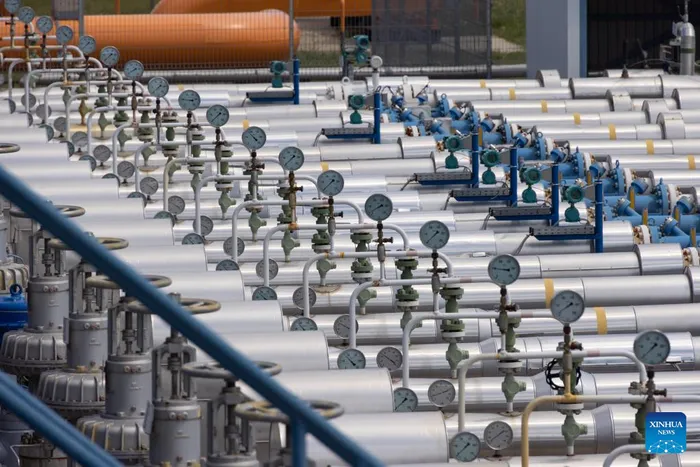
Gas pipes are seen at a natural gas storage facility operated by Hungarian Gas Storage Ltd. in the village of Zsana, Hungary, May 20, 2022.
Image: XINHUA
Over the past two years, the United States has intensified diplomatic and economic pressure on nations that continue to buy Russian oil, arguing that such purchases indirectly fund Moscow’s war in Ukraine. But for many in the Global South, particularly within the BRICS bloc, this pressure is not just about oil. It’s about sovereignty, development, and the right to chart an independent economic course in a world long dominated by Western interests.
India has been at the center of this tug-of-war. Since Western sanctions on Moscow began in 2022, Russia has become India’s largest crude supplier, accounting for about 35–36% of total imports in 2023–24, up from just 2% before the Ukraine conflict. That translates to roughly 1.57 million barrels per day (bpd) out of India’s total 4.88 million bpd oil imports. Russian crude, often sold at a discount of $8–12 per barrel compared to Brent, has saved India billions of dollars in foreign exchange while keeping domestic fuel prices stable, a crucial factor in a country where inflation has hovered around 5.1% this year.
Despite this, Washington continues to pressure New Delhi to scale back. US officials have suggested that India’s purchases “finance Moscow’s aggression,” and in August, the Trump administration reportedly raised tariffs on Indian exports to 50%, accusing New Delhi of “undermining sanctions.” India, however, has resisted outright compliance. Trade Secretary Rajesh Agarwal noted that while New Delhi is open to expanding energy cooperation with the US, decisions will depend on “price competitiveness and national interest.” Simply put, India is unwilling to pay more for energy to satisfy Western political goals.
The US campaign extends beyond India. Japan, a key US ally and member of the G7, has also faced renewed calls to halt its imports of Russian oil and gas. Treasury Secretary Scott Bessent reportedly urged Tokyo to “phase out Russian energy,” even though Japan relies on it for roughly 9% of its liquefied natural gas (LNG) — valued at ¥582 billion (US$3.9 billion) in 2023. Tokyo had initially stopped importing Russian crude but was later granted a special sanctions waiver by Washington to continue buying from the Sakhalin-2 project, which supplies critical LNG to Japan’s northern regions.
These inconsistencies reveal a deeper truth: US sanctions often serve political optics more than global economic balance. Allies are granted flexibility when energy realities demand it, while Global South nations face punitive measures when asserting the same logic.
For Russia, the redirection of oil flows to Asia has been transformative. In 2021, Europe accounted for over 50% of Russian oil exports; by mid-2024, that number had fallen below 15%, replaced almost entirely by shipments to India, China, and other Asian markets. Chinese imports of Russian crude have also surged to 2.3 million bpd, up 24% year-on-year, according to China’s General Administration of Customs.
This reorientation has helped Moscow maintain energy revenues despite sanctions, while deepening economic ties within the BRICS framework. The bloc’s members now account for about 40% of global GDP (PPP-adjusted) and nearly 45% of world oil production. With both Saudi Arabia and Russia among the top two global exporters, BRICS energy cooperation could reshape pricing mechanisms, logistics corridors, and currency settlements.
In fact, Russia and India have already begun settling part of their energy trade in rupees, while China and Russia conduct a growing share of transactions in yuan. These moves directly challenge the US dollar’s dominance in oil markets, a cornerstone of American geopolitical influence since the 1970s petrodollar system.
Washington’s strategy has created a clear divide. The US argues that energy buyers must “choose sides” between democracy and autocracy. But countries in the Global South see the issue differently: as a struggle for autonomy in a system where Western powers still dictate the rules. For India, China, and others, the question isn’t about loyalty to Russia, it’s about rejecting economic coercion disguised as moral diplomacy.
Moreover, the pressure campaign risks undermining global energy stability. A sudden halt to Russian oil imports could drive Brent crude above $100 per barrel, reigniting inflation worldwide. The International Energy Agency (IEA) warned in mid-2024 that any new disruption in Russian supply would “significantly tighten global markets” and threaten post-pandemic recovery in developing nations.
The real story, then, is not about compliance, it’s about reconfiguration. The US may be able to strong-arm smaller economies, but the geopolitical balance has shifted. BRICS nations, representing over half of the global population, are crafting new systems of trade, finance, and energy exchange that dilute Western leverage. Initiatives such as the BRICS Energy Research Platform and discussions on a shared settlement currency underscore this long-term vision of multipolar cooperation.
As the West struggles with slowing GDP growth, the US at 2.4%, the EU at just 1.1%, the Global South continues to expand, led by India’s projected 6.3% growth and China’s 4.5%. Energy independence, therefore, is not just an economic choice; it’s a strategic one, defining who gets to write the next chapter of global order.
The US campaign to isolate Russia through oil sanctions may have unintended consequences. It has accelerated the very multipolarity Washington once sought to prevent. For the BRICS and the wider Global South, this moment presents both a challenge and an opportunity: to build a more balanced energy architecture where access, affordability, and sovereignty are not dictated by a single power center.
In the end, the question is not whether nations will stop buying Russian oil, it’s whether they will continue accepting a world where such choices are made for them.
Written By:
*Dr Iqbal Survé
Past chairman of the BRICS Business Council and co-chairman of the BRICS Media Forum and the BRNN
*Chloe Maluleke
Associate at BRICS+ Consulting Group
Russian & Middle Eastern Specialist
** MORE ARTICLES ON OUR WEBSITE https://bricscg.com/
** Follow https://x.com/brics_daily on X/Twitter for daily BRICS+ updates